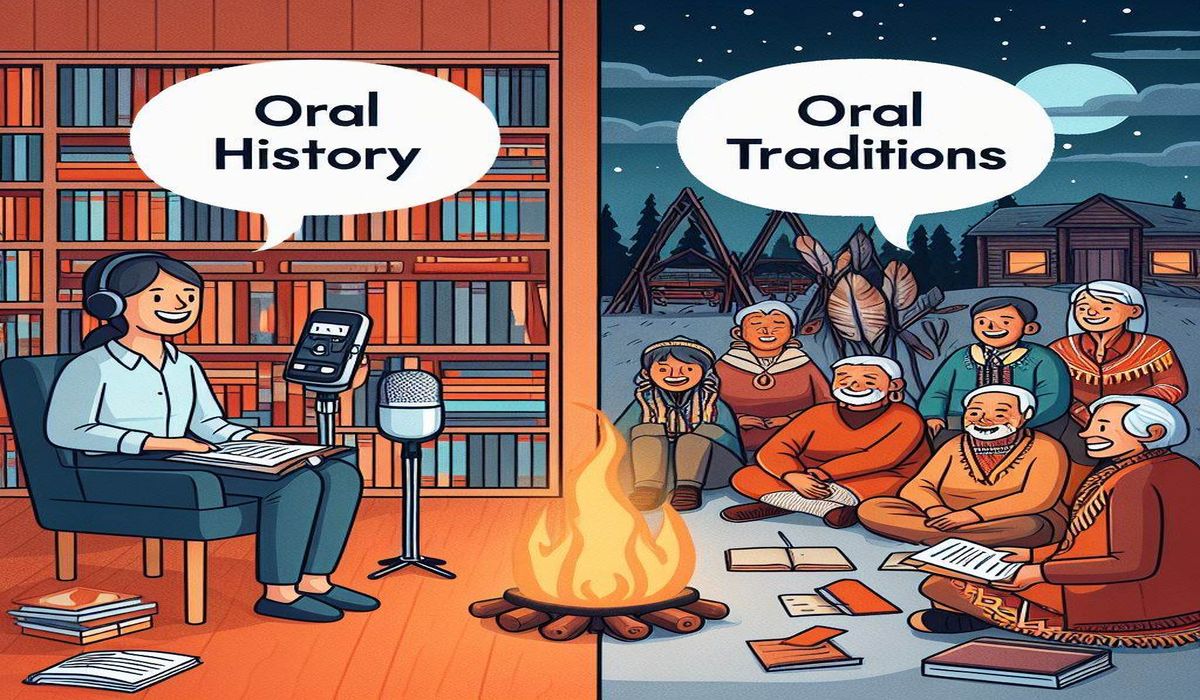History whispers through our ancestors’ voices, carried on the breath of tradition. But have you ever wondered if all spoken accounts of the past are created equal? The answer is no! There’s a fascinating distinction between oral history and oral traditions, and understanding it unlocks a deeper appreciation for the stories passed down through generations. While both rely on the power of the spoken word, their purposes and applications differ significantly.
The Essence of Oral Traditions:

Imagine a vibrant tapestry woven from threads of memory, belief, and cultural identity. That’s the essence of oral traditions. These are stories, songs, proverbs, and knowledge passed down orally, often without a fixed form. They can encompass myths and legends explaining natural phenomena, epic poems chronicling heroes’ deeds, or folktales conveying moral lessons. The key here is that these narratives are not necessarily tied to specific historical events, but rather serve as a repository of a community’s collective wisdom and values.
Oral History: Capturing Lived Experiences

Oral history, on the other hand, focuses on capturing personal experiences and firsthand accounts of historical events. Historians interview individuals who lived through a particular era, meticulously recording their memories and perspectives. This creates a rich archive of lived experiences, offering valuable insights beyond what written records might tell us. Imagine a veteran recounting their wartime experiences, or a community elder sharing stories of a bygone era – these are the cornerstones of oral history.
The Beautiful Intersection: Where the Past Comes Alive

While distinct, oral traditions and oral history often intersect in captivating ways. Folk songs might reference historical events, and personal narratives can be infused with cultural beliefs. This beautiful overlap enriches our understanding of the past. For instance, a folktale about a great flood might hold a kernel of truth about a historical natural disaster, while a veteran’s account of war might be laced with cultural values and traditions.
Below is a simple table comparing oral history and oral traditions.
| Aspect | Oral History | Oral traditions |
| Definition | The systematic collection of living people’s testimony about their own experiences | The transmission of cultural material through vocal utterances, stories, songs, poems, ballads, and folklore |
| Form | Often recorded or transcribed; based on interviews with participants | Typically unwritten; preserved and communicated orally |
| Content | Personal and specific experiences of individuals | Collective cultural history, myths, and origin stories of a people |
| Purpose | To document historical events from a personal perspective | To maintain and pass down cultural heritage and collective memory |
| Transmission | Through recorded interviews and personal narratives | Through storytelling, performances, and oral recitations |
| Preservation | In written or audiovisual archives | In the collective memory of the community |
| Evolution | Fixed once recorded; subject to scholarly interpretation | Dynamic and adaptable; evolves with each retelling |
| Historical Period | Focuses on recent history and living memory | Can encompass ancient history and pre-literate societies |
Why Does It Matter?

Both oral traditions and oral history play a crucial role in preserving the past. They offer unique perspectives, especially experiences of marginalized communities that are often missing from traditional historical accounts. By listening to these voices from the past, we gain a richer and more nuanced understanding of history. The next time you hear a folktale or an elder’s story, remember the power of the spoken word. It’s not just entertainment; it’s a bridge to the past, a testament to the enduring human spirit of sharing stories and preserving our heritage.
That’s it for this blog, I do hope it was enjoyable to read. Check out our blog post on From Oral Traditions to Written Word: The Evolution of Oral History where we look at the evolution of oral history from its origins in ancient storytelling to its current status as a recognized academic discipline.
Leave a comment in the comment section below or any questions you may have and we’ll be sure to get back to you. Remember to always be kind, stay positive and learn to unwind.
